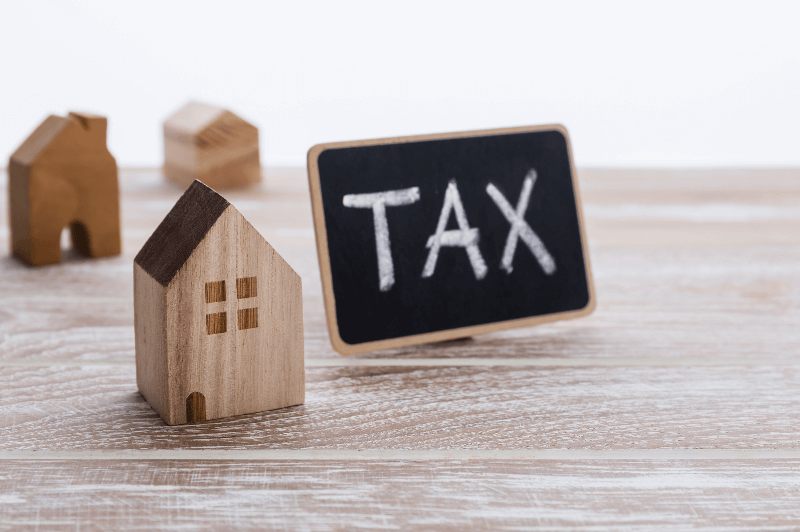When the time comes to say goodbye to your property one crucial aspect to consider is how to handle the associated taxes. It may feel overwhelming and complicated especially when it involves deciphering details like depreciation, capital gains, and IRS rules. However understanding the tax implications can make all the difference between making a sale or ending up with a substantial tax burden. This guide aims to simplify the complexities surrounding taxes on selling properties. We will explore topics such as recapturing depreciation, capital gains taxes and navigating IRS guidelines. Whether you’re from Dallas looking to sell your house or a real estate investor in Houston this guide will provide you with the knowledge needed to manage your tax responsibilities and sell your property in a tax-efficient way.
Handling Taxes on the Sale of a Rental Property
The initial step in managing taxes on the sale of a property is understanding your property’s “basis” for tax purposes. Simply put your basis typically includes the purchase price of the property along with any improvements you’ve made ( like installing a roof or an extension). When you sell a property the difference between the selling price and your adjusted basis will determine your capital gains.
Depreciation plays a role in tax calculations for property owners. You can claim depreciation deductions on your income tax return, which offers tax benefits over time. However when you sell the IRS may recapture some of these benefits through “depreciation recapture,” which is taxed as income and can increase your tax bill.
To lessen your tax burden consider a Section 1031 exchange, also known as a like-kind exchange. This involves exchanging your property for another ‘like kind’ investment property to defer both capital gains and depreciation recapture taxes.
Another approach is tax loss harvesting, where you offset capital gains from selling your property with losses from investments to reduce your tax liability. Moreover, it’s essential to track all expenses related to the sale of the property such as closing costs and improvements as these can decrease your capital gains and lower your tax bill. Keeping records is crucial, for preparing your taxes.
These strategies vary in complexity. Their suitability depends on circumstances. Therefore it’s always an idea to seek advice from professionals when dealing with these tax laws. Keep in mind that the aim is to maximize your profits when selling your property while minimizing your tax obligations.
What Is Capital Gains Tax?
Capital Gains Tax (CGT) is a tax imposed on the profit you earn from selling or disposing of an asset. In the realm of estate this tax applies to the profit gained from selling properties. The profit is determined by calculating the difference between the selling price and the adjusted basis of the property. The adjusted basis comprises the purchase price, any capital improvements made and deductions for depreciation claimed during ownership.
However not all property sales are subject to this tax. The Internal Revenue Service (IRS) offers an exemption for sales of residences. If you have lived in a property for two out of the five years you may be exempt from paying capital gains tax on its sale.
The specific rate of capital gains tax can vary depending on factors, like your income bracket and how long you have owned the asset. When you sell a property that you’ve owned for over a year the capital gains tax rates are usually lower compared to properties held for less than a year. Knowing how capital gains tax works when selling your property can help you prepare for tax implications and explore ways to reduce your tax burden.
How Does Capital Gains Tax Work
The profit from selling a property is subject to capital gains tax calculated based on the difference between the sale price and the adjusted basis of the property. It’s essential to understand that the IRS treats this profit as income.
To determine your capital gains tax, start by identifying your tax bracket. In the United States taxes are progressive meaning income results in higher tax rates. However long term capital gains (profits, from assets held over a year) are taxed at 0%, 15% or 20% depending on your income level. Additionally your filing status can influence your tax rate.
Once you figure out which tax bracket you fall into you can use that information to work out the capital gains tax owed on the sale of your property. For instance if you find yourself in the 15% tax bracket and you make a $100,000 profit from selling a property your capital gains tax would amount to $15,000.
For couples filing joint profits up to $80,000 are subject to a 0% tax rate while for filers this rate applies to profits up to $40,000.
It’s crucial to take into account depreciation recapture. This involves recognizing gains generated from depreciation deductions claimed on your tax returns. The IRS mandates that these gains be reported as income and typically taxes them at a fixed rate of 25%. Any remaining gain is then taxed at the capital gains tax rate.
Remember that tax regulations are subject to change and each real estate investor’s circumstances are unique. Hence it’s advisable to seek advice from tax professionals to ensure compliance with all IRS regulations and minimize your tax obligations.
Do You Have to Pay Capital Gains Tax
Although it’s generally required to pay capital gains taxes on the sale of properties there are some exceptions.
The tax regulations offer opportunities for deductions and exclusions that can lower your tax payments. For instance, if you resided in the property as your home for two of the previous five years before selling it you could exclude a portion of your profit from capital gains tax up to $250,000 ($500,000 for married couples filing jointly). This exemption is commonly referred to as the “Primary Residence Exclusion.”
Another option is engaging in a like-kind exchange. What’s known as a Section 1031 exchange. This method allows you to delay paying capital gains tax by reinvesting the sale proceeds into an investment property.
It’s important to mention that if your property has decreased in value and you’re selling it at a loss you won’t owe any capital gains tax. In fact, you might be able to use this loss to offset income through a strategy called tax loss harvesting.
Keep in mind that tax laws are intricate and can change. It’s advisable to seek guidance from a tax professional who can navigate the complexities of IRS rules and assist in minimizing your tax obligations.
How To Calculate Capital Gains Tax On Rental Property
Calculating capital gains tax on your rental property involves several steps:
- Calculate Your Property’s Adjusted Basis: To figure out the adjusted basis of your property consider factors, like the original purchase price costs of any improvements you’ve made over time and depreciation deductions you’ve taken. Use this formula to calculate it:
`Original Purchase Price + Cost of Capital Improvements – Depreciation = Adjusted Basis`
- Calculate Your Property’s Sale Price: When calculating your property’s sale price take into account the amount received from selling it minus any expenses related to the sale or closing.
- Determine Your Capital Gain: Subtract your property’s adjusted basis from its sale price. If the result is positive you’ve made a capital gain; if negative it’s a capital loss. The formula is:
`Sale Price – Adjusted Basis = Capital Gain (or Loss)`
- Calculate Your Capital Gains Tax: If you have a capital gain be prepared to pay capital gains tax. The tax rate will vary based on factors like your income bracket. How long you owned the property – whether it was short-term (less than one year) or long-term (more than one year).
Keep in mind that these calculations provide an overview of a process – many variables can influence your final tax obligations. Make sure to seek advice from a tax expert or accountant to ensure the calculation of your capital gains tax.

How To Minimize Taxes When Selling Your Rental Property
Minimizing the taxes you owe when selling your property is a part of smart real estate investing. It’s not just about the selling price and the profits; it involves having a grasp of the tax laws, including factors like improvements, initial cost, recapturing depreciation and exchanges of properties. Planning ahead could potentially help you save an amount of money. This section gives an overview of tactics to lessen your tax burden, boost your cash flow and maximize your profits from selling your property. Keep in mind that these strategies are subject to IRS rules and its always wise to consult with a tax professional before making any decisions.
Sell to a Cash Home Buyer
Choosing to sell to a cash buyer for homes like Ready House Buyer can be a way to decrease your tax responsibilities. This is because companies that say “We buy houses Dallas TX” typically buy properties in their condition eliminating the need for repairs or upgrades. This can be especially advantageous if your rental property has lost value over time.
Another benefit of selling to a cash home buyer in Fort Worth is the quickness of the transaction. Closing periods, which can be as brief as a week, offer the opportunity to secure funds for investing in a property through a 1031 Exchange. This method, based on Section 1031 of the Internal Revenue Code allows real estate investors to sell a property, reinvest the profits in another property, and delay payment of capital gains taxes.
Use a 1031 Exchange
A 1031 Exchange, named after Section 1031 of the Internal Revenue Code, allows a real estate investor to sell a property, reinvest the proceeds in a new property, and defer all capital gain taxes. To benefit from this strategy certain guidelines must be adhered to, such as identifying the replacement property within 45 days of selling the one and completing the purchase within 180 days. By utilizing this approach you can postpone taxes on capital gains, depreciation recapture, and ordinary income that may result from selling properties.
It’s essential to understand that a 1031 Exchange is not about avoiding taxes but deferring them until a date when you sell the replacement property. Navigating the tax regulations related to 1031 Exchanges can be overwhelming; therefore seeking advice from tax professionals or real estate experts is advisable to manage your tax obligations when divesting your rental properties.
Consider Depreciation Recapture Tax
When you decide to sell a property you’ll have to deal with taxes related to the depreciation deductions you’ve taken throughout the years. This tax, known as depreciation recapture tax can have an impact on the amount of capital gains tax you’ll owe.
Depreciation is a tax benefit that allows property owners to deduct the cost of purchasing and improving a property over time from their income. However, when you sell the property any gain resulting from depreciation is considered income by the IRS than capital gains. As a result, it’s taxed at your income tax rate rather than at the lower capital gains rate.
To calculate your depreciation recapture tax you need to figure out your accumulated depreciation deductions and then multiply that amount by 25%. This portion of capital gains will be added to what you owe in taxes increasing your tax liability.
Be Mindful of Capital Gains Tax Rates
It’s important to be aware of the different capital gains tax rates that apply when selling a property. For investments held for more than one year (considered term) federal income tax rates currently range from 0% to 20% depending on your taxable income and filing status. When it comes to short-term investments which are those held for less than a year the tax rate is determined based on your regular income tax bracket. Understanding how these capital gains tax rates might impact your tax responsibility when you sell a property is crucial.
If you find yourself in an income tax bracket you could end up paying more in taxes on the property sale. Conversely, if you fall into a tax bracket you might retain a portion of the profits from selling your home. Short-term capital gains taxes tend to be more expensive compared to long-term capital gains taxes, which typically incur taxes.
Consider Your Property Basis
Taking into account your property basis is another aspect to consider when offloading a property. This pertains to the purchase price of the property and any enhancements or upgrades made over time. The higher your property basis the lesser your taxable gain will be upon selling.
Maintaining records of all expenses and improvements related to the property over the years of ownership is vital. These expenses can help bolster your property basis and lessen your tax burden when the time comes to sell.

Conclusion
In summary delving into the realm of property taxes can seem overwhelming, for a real estate investor. However, having a grasp of concepts like capital gains tax rates, depreciation recapture and the significance of property basis can help you navigate strategically and potentially lower your overall tax obligations. It’s not about selling your house fast in Houston, TX; it’s also about doing so in a tax-efficient manner.
Remember that keeping records can serve as a strong defense against facing higher tax bills. It’s wise to seek advice from a tax expert to ensure you’re optimizing your property investment and staying compliant with the Internal Revenue Code. Selling a property doesn’t have to be a taxing ordeal; with planning and informed choices, you can smoothly navigate the process maximizing profits while minimizing tax burdens.

